2020年秋八年级英语上册 Unit 7 Will people have robots词句梳理Section B(1a-1e) (新版)人教新目标版
人教版英语八年级上册Unit 7《Will people have robots》教学设计
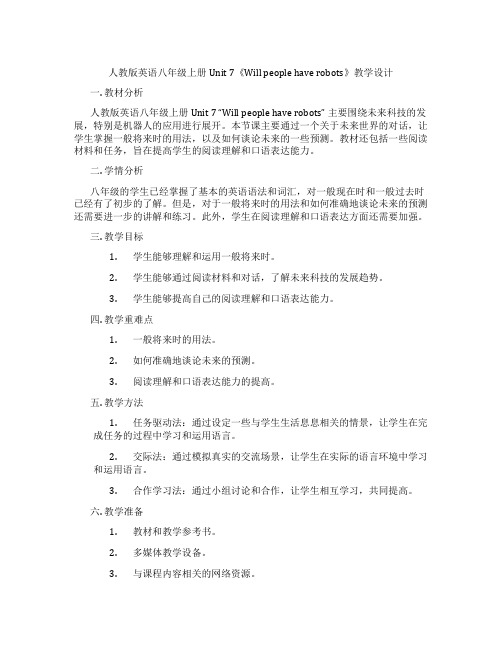
人教版英语八年级上册Unit 7《Will people have robots》教学设计一. 教材分析人教版英语八年级上册Unit 7 “Will people have robots” 主要围绕未来科技的发展,特别是机器人的应用进行展开。
本节课主要通过一个关于未来世界的对话,让学生掌握一般将来时的用法,以及如何谈论未来的一些预测。
教材还包括一些阅读材料和任务,旨在提高学生的阅读理解和口语表达能力。
二. 学情分析八年级的学生已经掌握了基本的英语语法和词汇,对一般现在时和一般过去时已经有了初步的了解。
但是,对于一般将来时的用法和如何准确地谈论未来的预测还需要进一步的讲解和练习。
此外,学生在阅读理解和口语表达方面还需要加强。
三. 教学目标1.学生能够理解和运用一般将来时。
2.学生能够通过阅读材料和对话,了解未来科技的发展趋势。
3.学生能够提高自己的阅读理解和口语表达能力。
四. 教学重难点1.一般将来时的用法。
2.如何准确地谈论未来的预测。
3.阅读理解和口语表达能力的提高。
五. 教学方法1.任务驱动法:通过设定一些与学生生活息息相关的情景,让学生在完成任务的过程中学习和运用语言。
2.交际法:通过模拟真实的交流场景,让学生在实际的语言环境中学习和运用语言。
3.合作学习法:通过小组讨论和合作,让学生相互学习,共同提高。
六. 教学准备1.教材和教学参考书。
2.多媒体教学设备。
3.与课程内容相关的网络资源。
七. 教学过程1.导入(5分钟)通过向学生展示一些机器人的图片,引起学生的兴趣,然后提问:“你们认为未来的人们会拥有机器人吗?”,让学生发表自己的看法。
2.呈现(10分钟)老师通过讲解和示范,向学生介绍一般将来时的用法,并举例说明如何准确地谈论未来的预测。
3.操练(10分钟)学生分组进行角色扮演,模拟真实的交流场景,运用一般将来时进行对话。
老师对学生的表现进行指导和评价。
4.巩固(10分钟)学生阅读教材中的阅读材料,理解并回答相关问题。
八年级英语上册Unit7Willpeoplehaverobots知识点归纳(新版)
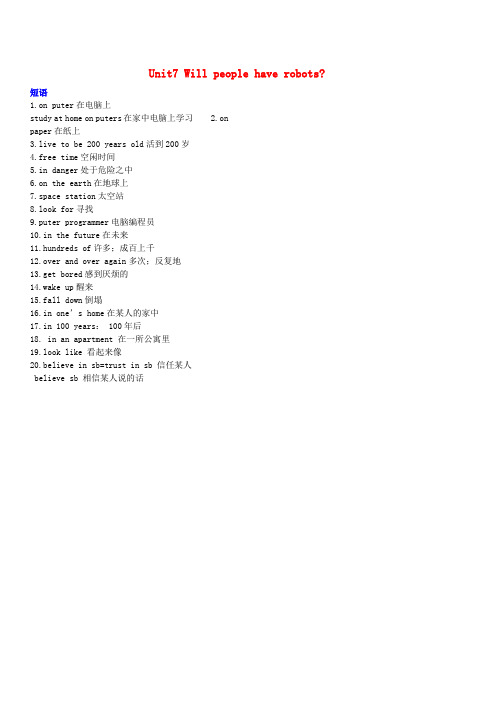
Unit7 Will people have robots?短语1.on puter在电脑上study at home on puters在家中电脑上学习 2.onpaper在纸上3.live to be 200 years old活到200岁4.free time空闲时间5.in danger处于危险之中6.on the earth在地球上7.space station太空站8.look for寻找9.puter programmer电脑编程员10.in the future在未来11.hundreds of许多;成百上千12.over and over again多次;反复地13.get bored感到厌烦的14.wake up醒来15.fall down倒塌16.in one’s home在某人的家中17.in 100 years: 100年后18. in an apartment 在一所公寓里19.look like 看起来像20.believe in sb=trust in sb 信任某人believe sb 相信某人说的话用法:1.will+动词原形将要做……2.fewer/more+可数名词复数更少/更多……less/more+不可数名词更少/更多……3.have to do sth.不得不做某事(客观) must 必须(主观)5.There will be + 主语+其他将会有……6.There is/are +sb./sth.+doing sth.有……正在做某事7.make sb. do sth. 8.help sb. with sth.帮助某人做某事9.What will the future be like ? 未来将会是什么样子?10.Which side do you agree with ?你同意哪一方的观点?。
八年级英语上册Unit7Willpeoplehaverobots全部重要知识点(带答案)

八年级英语上册Unit7Willpeoplehaverobots全部重要知识点单选题1、There ______ an English show this weekend. Shall we go and watch it?A.are going to beB.wasC.will beD.were答案:C句意:这个周末将有一场英语表演。
我们去看好吗?考查there be句型的一般将来时。
根据“There”及“this weekend”可知,此句要用there be句型的一般将来时there is/are going to be或there will be的结构,排除B和D选项。
an English show是单数,be要用is,排除A,故选C。
2、We have decided to sell five things ________ we no longer use.A.thatB.whereC.who答案:A句意“我们已经决定卖5个我们不再用的东西”。
本题考查定语从句。
A.关系代词,指人,在从句中作主语、宾语或表语;B.关系副词,表示地点,在从句中作状语;C.关系代词,指人,在从句中作主语和宾语。
本句话中,先行词为five things,指物,且在从句中作宾语,用that,故选A。
3、—Is Helen here?—No, she isn’t here, She ________ in half an hour.A.arrivesB.arrivedC.will arriveD.has arrived答案:C句意:——Helen在这里吗?——不,她不在,她半个小时后就到了。
考查动词时态。
根据“in half an hour”可知,时间为半个小时后,应用一般将来时;其构成为:will+动词原形。
故选C。
4、---It’s reported that Chinese ___________more than 40 minutes a day reading WeChat(微信).---It’s true. But I think WeChat is taking too much of our time.A.spendB.costC.payD.take答案:A试题分析:句意:——据报道中国人一天花费四十多分钟读微信。
人教版英语八年级上册全册教材全解:人教版英语八年级上册 Unit 7 Will people hav
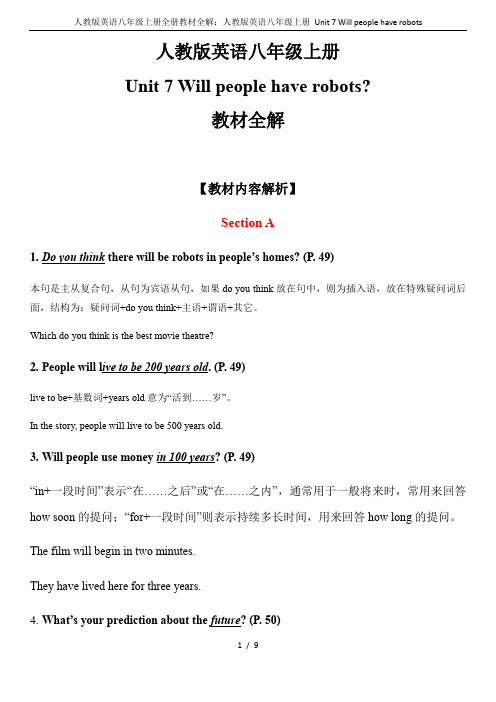
人教版英语八年级上册Unit 7 Will people have robots?教材全解【教材内容解析】Section A1.Do you think there will be robots in people’s homes? (P. 49)本句是主从复合句,从句为宾语从句,如果do you think放在句中,则为插入语,放在特殊疑问词后面,结构为:疑问词+do you think+主语+谓语+其它。
Which do you think is the best movie theatre?2.People will l ive to be 200 years old. (P. 49)live to be+基数词+years old意为“活到……岁”。
In the story, people will live to be 500 years old.3.Will people use money in 100 years? (P. 49)“in+一段时间”表示“在……之后”或“在……之内”,通常用于一般将来时,常用来回答how soon的提问;“for+一段时间”则表示持续多长时间,用来回答how long的提问。
The film will begin in two minutes.They have lived here for three years.4.What’s your prediction about the future?(P. 50)future作名词,表示“将来、未来”,in the future表示“在将来”。
Who knows what will happen in the future.5.I don’t think so.(P. 50)I don’t think so表示“我不这么认为”,肯定形式为I think so。
---Look at the cloud. It is going to rain.---I don’t think so. It will be sunny soon.【拓展】类似的结构还有:I hope so“我希望如此”,I hope not“我希望不是这样”,I’m afraid so“恐怕如此”,I’m afraid not“恐怕不是这样的”。
(完整版)八年级上册英语第七单元
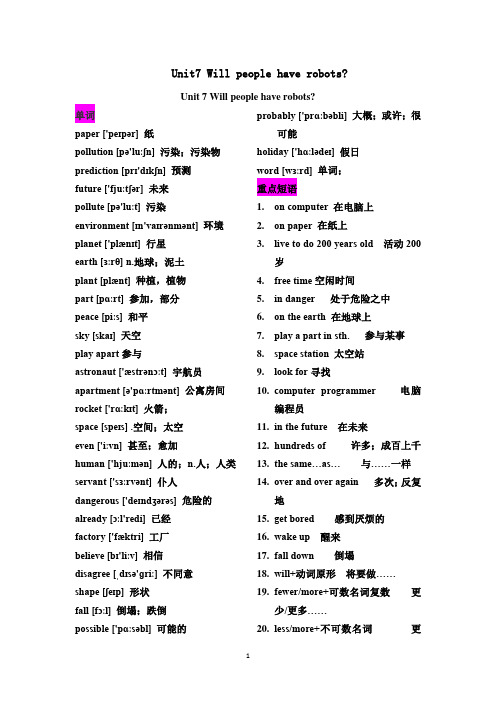
Unit7 Will people have robots? Unit 7 Will people have robots?单词paper ['peɪpər] 纸pollution [pə'luːʃn] 污染;污染物prediction [prɪ'dɪkʃn] 预测future ['fjuːtʃər] 未来pollute [pə'luːt] 污染environment [ɪn'vaɪrənmənt] 环境planet ['plænɪt] 行星earth [ɜːrθ] n.地球;泥土plant [plænt] 种植,植物part [pɑːrt] 参加,部分peace [piːs] 和平sky [skaɪ] 天空play apart参与astronaut ['æstrənɔːt] 宇航员apartment [ə'pɑːrtmənt] 公寓房间rocket ['rɑːkɪt] 火箭;space [speɪs] .空间;太空even ['iːvn] 甚至;愈加human ['hjuːmən] 人的;n.人;人类servant ['sɜːrvənt] 仆人dangerous ['deɪndʒərəs] 危险的already [ɔːl'redi] 已经factory ['fæktri] 工厂believe [bɪ'liːv] 相信disagree [ˌdɪsə'ɡriː] 不同意shape [ʃeɪp] 形状fall [fɔːl] 倒塌;跌倒possible ['pɑːsəbl] 可能的probably ['prɑːbəbli] 大概;或许;很可能holiday ['hɑːlədeɪ] 假日word [wɜːrd] 单词;重点短语1.on computer 在电脑上2.on paper 在纸上3.live to do 200 years old 活动200岁4.free time空闲时间5.in danger 处于危险之中6.on the earth 在地球上7.play a part in sth. 参与某事8.space station 太空站9.look for寻找puter programmer 电脑编程员11.in the future 在未来12.hundreds of 许多;成百上千13.the same…as… 与……一样14.over and over again 多次;反复地15.get bored 感到厌烦的16.wake up 醒来17.fall down 倒塌18.will+动词原形将要做……19.fewer/more+可数名词复数更少/更多……20.less/more+不可数名词更少/更多……21.have to do sth.不得不做某事22.agree with sb. 同意某人的意见23.such+名词(词组)如此……24.play a part in doing sth. 参与做某事25.There will be + 主语+其他将会有……26.There is/are +sb./sth.+doing sth.有……正在做某事27.make sb. do sth. help sb.with sth. 帮助某人做某事28.try to do sth. 尽力做某事29.It’s+ adj.+for sb. to do sth. 对某人来说,做某事……的。
初中英语人教版八年级上Unit7Willpeoplehaverobots_短语句子
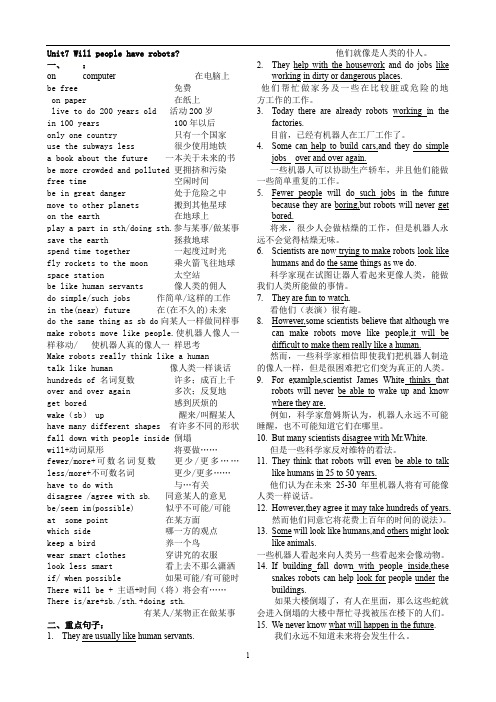
Unit7 Will people have robots?一、短语:on computer 在电脑上be free 免费on paper 在纸上live to do 200 years old 活动200岁in 100 years 100年以后only one country 只有一个国家use the subways less 很少使用地铁a book about the future 一本关于未来的书be more crowded and polluted 更拥挤和污染free time 空闲时间be in great danger 处于危险之中move to other planets 搬到其他星球on the earth 在地球上play a part in sth/doing sth.参与某事/做某事save the earth 拯救地球spend time together 一起度过时光fly rockets to the moon 乘火箭飞往地球space station 太空站be like human servants 像人类的佣人do simple/such jobs 作简单/这样的工作in the(near) future 在(在不久的)未来do the same thing as sb do向某人一样做同样事make robots move like people.使机器人像人一样移动/ 使机器人真的像人一样思考Make robots really think like a humantalk like human 像人类一样谈话hundreds of 名词复数许多;成百上千over and over again 多次;反复地get bored 感到厌烦的wake(sb) up 醒来/叫醒某人have many different shapes 有许多不同的形状fall down with people inside 倒塌will+动词原形将要做……fewer/more+可数名词复数更少/更多……less/more+不可数名词更少/更多……have to do with 与…有关disagree /agree with sb. 同意某人的意见be/seem im(possible) 似乎不可能/可能at some point 在某方面which side 哪一方的观点keep a bird 养一个鸟wear smart clothes 穿讲究的衣服look less smart 看上去不那么潇洒if/ when possible 如果可能/有可能时There will be + 主语+时间(将)将会有……There is/are+sb./sth.+doing sth.有某人/某物正在做某事二、重点句子:1.They are usually like human servants.他们就像是人类的仆人。
人教版2020年八年级英语上册Unit7Willpeoplehaverobots讲义(新版)人教新目标版

Unit 7 Will people have robots? (讲义) Words and expressionspaper /'peɪpə(r)/ n. 纸;纸张pollution /pə'luːʃn/ n. 污染;污染物prediction /prɪ'dɪkʃn/ n. 预言;预测future /'fjuːtʃə(r)/ n. 将来;未来pollute /pə'luːt/ v. 污染environment /ɪn'vaɪrənmənt/ n.环境planet/'plænɪt/ n. 行星earth /ɜː(r)θ/n. 地球;世界plant /plɑːnt/ v. 种植n. 植物part /pɑː(r)t/ n. 参加;参与;部分play a part 参与(某事)peace /piːs/ n. 和平sea /siː/ n. 海;海洋sky /skaɪ/ n. 天空astronaut /'æstrənɔːt/ n. 宇航员;航天员apartment /ə'pɑː(r)tmənt/ n. 公寓套房rocket /'rɒkɪt/ n. 火箭space /speɪs/ n. 太空;空间space station 太空站;宇宙空间站human /'hjuːmən/ adj. 人的n. 人servant /'sɜː(r)vənt/ n. 仆人dangerous /'deɪndʒərəs/ adj. 有危险的;不安全的already /ɔːl'redi/ adv.已经;早已factory /'fæktəri/ n. 工厂over and over again 多次;反复地believe /bɪ'liːv/ v.相信;认为有可能disagree /,dɪsə'griː/ v.不同意;持不同意见;有分歧even /'iːvn/ adv.甚至;连;愈加hundreds of 许多;大量shape /ʃeɪp/ n. 形状;外形fall /fɔːl/ v. (fell /fel/) 倒塌;跌倒;掉落fall down 突然倒下;跌倒;倒塌inside /ɪn'saɪd/ adv. & prep. 在……里面look for 寻找;寻求possible /'pɒsəbl/ adj. 可能存在或发生的;可能的impossible /ɪm'pɒsəbl/ adj. 不可能存在或发生的;不可能的side /saɪd/ n. 一方(的意见、态度、立场)probably /'prɒbəbli/ adv.很可能;大概during /'djʊərɪŋ/ prep. 在……期间holiday /'hɒlədeɪ/ n. 假期;假日word /wɜː(r)d/ n. 单词;词Nick /nɪk/ 尼克(男名)James /dʒeɪmz/ 詹姆斯(男名)White /waɪt/ 怀特(姓)Role-playNick: What are you reading, Jill?Jill: It’s a book about the future.Nick: Sounds cool. So what will the future be like?Jill: Well, cities will be more crowded and polluted. There will be fewer trees and the environment will be in great danger. Nick: That sounds bad! Will we have to move to other planets? Jill: Maybe. But I want to live on the earth.Nick: Me, too. Then what can we do?Jill: We can use less water and plant more trees. Everyone should play a part in saving the earth.Grammar focus’ll=willwon’t=will not3a Fill in the blanks with more, less or fewer.1.In the future, there will be fresh water because there will bepollution in the sea.2.In 100 years, there will be cars because there will bepeople in the cities.3.There will be jobs for people because robotswill do the same jobs as people.4.I think there will be cities because people will buildbuildings in the country.5.In 50 years, people will have free time because therewill be things to do.Reading2b Read the article and match each paragraph with the questionsit discusses.Paragraph 1 Will robots think like humans in thefuture? Paragraph 2 What will robots be like in the future? Paragraph 3 What can robots do today?Paragraph 4 What are robots like in movies?Do You Think You Will Have Your Own Robot?1.When we watch movies about the future, we sometimes see robots. Theyare usually like human servants. They help with the housework and do jobs like working in dirty or dangerous places.2.Today there are already robots working in factories. Some can helpto build cars, and they do simple jobs over and over again. Fewer people will do such jobs in the future because they are boring, but robots will never get bored.3.Scientists are now trying to make robots look like humans and dothe same things as we do. Some robots in Japan can walk and dance.They are fun to watch. However, some scientists believe that although we can make robots move like people, it will be difficult to make them really think like a human. For example, scientist James White thinks that robots will never be able to wake up and know where they are. But many scientists disagree with Mr. White. They think that robots will even be able to talk like humans in 25 to 50 years.4.Some scientists believe that there will be more robots in the future.However, they agree it may take hundreds of years. These new robots will have many different shapes. Some will looks like humans, and others might look like animals. In India, for example, scientists made robots that look like snakes. If buildings fall down with people inside, these snake robots can help look for people under thebuildings. This was not possible 20 years ago, but computers and rockets also seemed impossible 100 years ago. We never know what will happen in the future!Exercises一、填空1.Our (环境) will be better if we protect it.2.The (预言) didn’t come true.3.His uncle is an (宇航员).4.He worked in a (太空站) last year.5.There are five (仆人) in his family.6.Tom was surprised by all the (pollute) on the beach.7.We hope the world will be (peace).8.Be away from the tiger. It’s(danger).9.It’s too late. I (agree) that we go there today.10.It seems (possible) that people can fly.二、单选( )11. Please pass me two .A.pieces of paperB. pieces of papersC. pieces paperD. piece papers( )12. Let’s play a part the room.A. cleanB. cleaningC. to cleanD. in cleaning( )13. volunteers will give out leaflets(传单) to ask people to protect the wetlands(湿地).A. Two hundredsB. Hundreds ofC. Two hundred ofD. Hundred of( )14. , Tom! It’s time to get up and go to school.A. Wake upB. Make upC. Grow upD. Look up ()15. John will go to France on vacation this summer.A. possibleB. impossibleC. probablyD. probable( )16. It is difficult for a robot _ thesame things aperson does.A. doing; likeB. do; fromC. to do; asD. does; as( )17. —What are you doing in the room?—I’m my hat.A. looking afterB. looking forC. looking upD. looking like( )18. There are some students the classroom.A. cleanB. to cleaningC. cleaningD. cleans( )19. There are many clouds _ the sky.A. inB. onC. atD. to( )20. I think the movie is interesting. But he disagrees me.A. inB. withC. toD. of( )21. It’s7 p.m., but the children are not backyet.A. alsoB. eitherC. alreadyD. only( )22. If there are people driving, there will be _air pollution.A. less; lessB. less; fewerC. fewer; fewerD. fewer;less( )23. —Willthere be schools in the future?—I think students will study at home on the Internet.A. Yes, there will.B. No, there won’t.C. Yes, there is.D. No, there isn’t.三、翻译24.你同意将来会有更多的污染吗?Do you that there will be more pollution?25.你能告诉我未来是什么样子吗?Can you tell me what the ? 26.你必须反复地练习才能做得很好。
人教版英语八年级上册Unit7《Will people have robots_》知识点
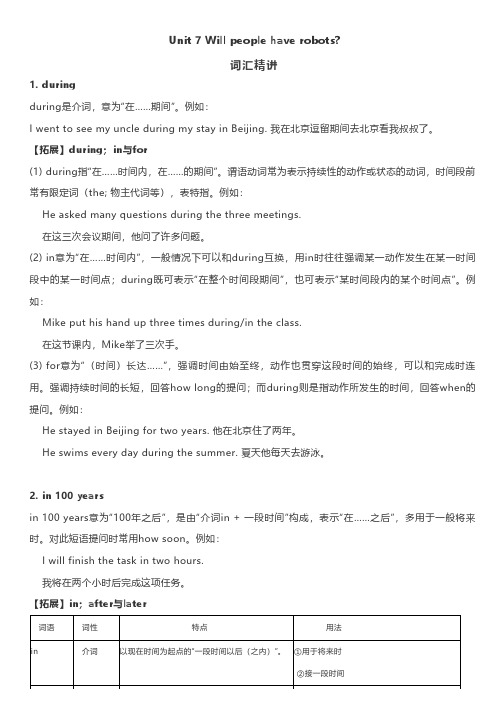
Unit 7 Will people have robots?词汇精讲1. duringduring是介词,意为“在……期间”。
例如:I went to see my uncle during my stay in Beijing. 我在北京逗留期间去北京看我叔叔了。
【拓展】during;in与for(1) during指“在……时间内,在……的期间”。
谓语动词常为表示持续性的动作或状态的动词,时间段前常有限定词(the; 物主代词等),表特指。
例如:He asked many questions during the three meetings.在这三次会议期间,他问了许多问题。
(2) in意为“在……时间内”,一般情况下可以和during互换,用in时往往强调某一动作发生在某一时间段中的某一时间点;during既可表示“在整个时间段期间”,也可表示“某时间段内的某个时间点”。
例如:Mike put his hand up three times during/in the class.在这节课内,Mike举了三次手。
(3) for意为“(时间)长达……”,强调时间由始至终,动作也贯穿这段时间的始终,可以和完成时连用。
强调持续时间的长短,回答how long的提问;而during则是指动作所发生的时间,回答when的提问。
例如:He stayed in Beijing for two years. 他在北京住了两年。
He swims every day during the summer. 夏天他每天去游泳。
2. in 100 yearsin 100 years意为“100年之后”,是由“介词in + 一段时间”构成,表示“在……之后”,多用于一般将来时。
对此短语提问时常用how soon。
例如:I will finish the task in two hours.我将在两个小时后完成这项任务。
Unit,7,Will,people,have,robots教案
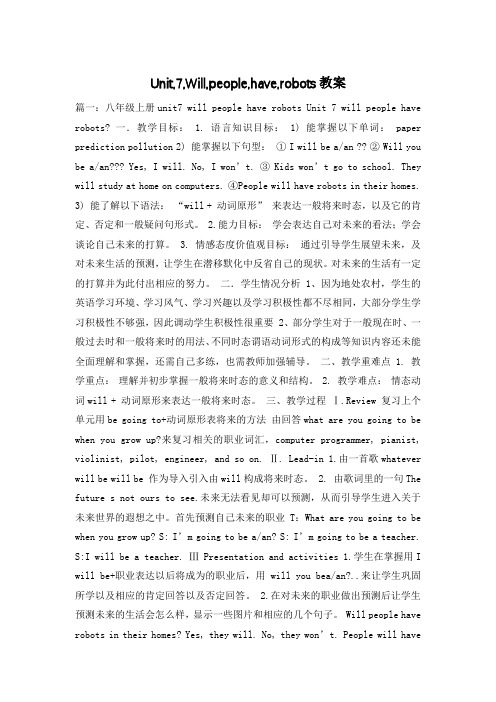
Unit,7,Will,people,have,robots教案篇一:八年级上册unit7 will people have robots Unit 7 will people have robots? 一.教学目标: 1. 语言知识目标: 1) 能掌握以下单词: paper prediction pollution 2) 能掌握以下句型:① I will be a/an ?? ② Will you be a/an??? Yes, I will. No, I won’t. ③ Kids won’t go to school. They will stud y at home on computers. ④People will have robots in their homes.3) 能了解以下语法:“will + 动词原形” 来表达一般将来时态,以及它的肯定、否定和一般疑问句形式。
2.能力目标:学会表达自己对未来的看法;学会谈论自己未来的打算。
3. 情感态度价值观目标:通过引导学生展望未来,及对未来生活的预测,让学生在潜移默化中反省自己的现状。
对未来的生活有一定的打算并为此付出相应的努力。
二.学生情况分析 1、因为地处农村,学生的英语学习环境、学习风气、学习兴趣以及学习积极性都不尽相同,大部分学生学习积极性不够强,因此调动学生积极性很重要 2、部分学生对于一般现在时、一般过去时和一般将来时的用法、不同时态谓语动词形式的构成等知识内容还未能全面理解和掌握,还需自己多练,也需教师加强辅导。
二、教学重难点 1. 教学重点:理解并初步掌握一般将来时态的意义和结构。
2. 教学难点:情态动词will + 动词原形来表达一般将来时态。
三、教学过程Ⅰ.Review 复习上个单元用be going to+动词原形表将来的方法由回答what are you going to be when you grow up?来复习相关的职业词汇,computer programmer, pianist, violinist, pilot, engineer, and so on. Ⅱ. Lead-in 1.由一首歌whatever will be will be 作为导入引入由will构成将来时态。
八年级英语上册 Unit 7 Will people have robots?(第2课时)说课稿

八年级英语上册 Unit 7 Will people have robots?(第2课时)说课稿一. 教材分析《八年级英语上册》Unit 7 “Will people have robots?” 是人教版新目标英语教材的一个单元。
本单元主要围绕未来科技的发展,特别是机器人在日常生活中的应用进行讲解。
通过本单元的学习,学生可以掌握一般将来时的被动语态,提高自己的听说读写能力,并激发他们对未来科技的想象和思考。
二. 学情分析八年级的学生已经掌握了英语学习的基本语法和词汇,具备一定的听说读写能力。
他们对新科技充满好奇,善于接受新鲜事物,但同时也可能对一些抽象的概念和语言表达感到困惑。
因此,在教学过程中,我们需要关注学生的个体差异,因材施教,激发他们的学习兴趣和积极性。
三. 说教学目标根据《义务教育英语课程标准》和教材内容,本节课的教学目标如下:1.知识目标:学生能够掌握一般将来时的被动语态,理解与未来科技相关的词汇和表达。
2.能力目标:学生能够在真实情境中运用所学知识进行交流,提高听说读写能力。
3.情感目标:激发学生对未来的想象和思考,培养他们对科技发展的积极态度。
四. 说教学重难点1.教学重点:学生能够熟练运用一般将来时的被动语态进行表达。
2.教学难点:学生能够准确理解与未来科技相关的词汇和表达,以及在真实情境中运用所学知识进行交流。
五. 说教学方法与手段本节课采用任务型教学法,结合情境教学法和分组合作学习法,利用多媒体教学手段,激发学生的学习兴趣,提高他们的参与度和积极性。
六. 说教学过程1.导入:通过展示一段关于未来科技的短片,引发学生对未来的想象,激发他们的学习兴趣。
2.呈现:教师通过PPT展示本节课的主要内容,引导学生关注一般将来时的被动语态和与未来科技相关的词汇。
3.操练:学生分组进行角色扮演,运用所学知识进行对话,教师给予指导和反馈。
4.巩固:学生完成一组有关未来科技的练习题,检测他们对知识的掌握程度。
八年级英语上册Unit7Willpeoplehaverobots知识点总结全面整理(带答案)

八年级英语上册Unit7Willpeoplehaverobots知识点总结全面整理单选题1、There ________ a football match this evening. Let’s go and watch it.A.are going to beB.wasC.will beD.were答案:C句意:今晚有一场足球赛。
我们去看吧。
考查there be句型的时态。
根据语境是there be句型,根据时间状语this evening可知,此处是there be的一般将来时,排除BD;其结构是There will be+主语+介词短语或There is/are going to be+主语+介词短语,主语是a football match,排除A。
故选C。
2、—I don't think sixteen-year-olds should be allowed to drive.—________! They are too young.A.I agreeB.It's a pityC.Good luck答案:A句意:——我认为不应该允许16岁的青少年开车。
——我赞同!他们太年轻了。
考查情景交际。
I agree我赞同;It's a pity真遗憾;Good luck祝你好运。
根据答句中“They are too young.”可知是赞同对方的想法,用I agree符合题意。
故选A。
3、To ________ the river means to make the river dirty.A.protectB.polluteC.provide答案:B句意:污染河流意味着河流会变脏。
考查动词词义辨析。
protect 保护;防护;pollute 污染;provide 提供;供应。
由“make the river dirty”可知此空应填污染。
故选B。
4、Could I use your dictionary? I need to _________ the new words.A.pick upB.look upC.clean upD.give up答案:B句意:我能用一下你的词典吗?我需要查一些生词。
2020年新目标人教版英语八年级上册《Unit7Willpeoplehaverobots?》课后作业试题及答案
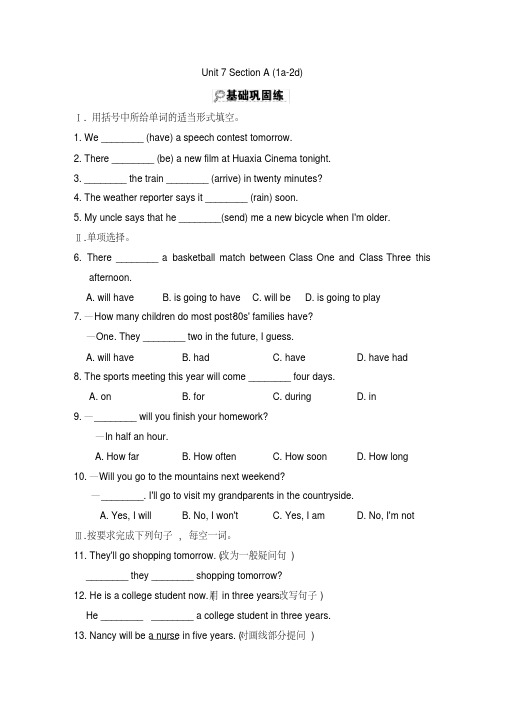
Ⅴ.根据对话内容 ,从方框中选择恰当的选项补全对话。
A :Hey, Peter. (21)________
B:A book about robots.
A :Robots? (22)________
B:Yes, that's for sure.
A :(23)________
B:They'll help us do all kinds of work. For example, they can help us cook regularly.
1. If we don't save water, there will be ________ water.
2. This weekend, I won't go to work, so I will have ________ time to be with my
daughter.
3. People are free to cut down trees. There will be ________ trees in the future.
A. sense
B. part
C. reason
D. meaning
9. — What will the future be like?
—I think cities will be ________ because there will be more and more cars.
A. crowded and crowded
C. Why do you think so? D. But I think more cars will bring more pollution.
E. Do you think there will be more people living in the city?
八年级英语上册 Unit 7 Will people have robots(1a-2c)教材分析
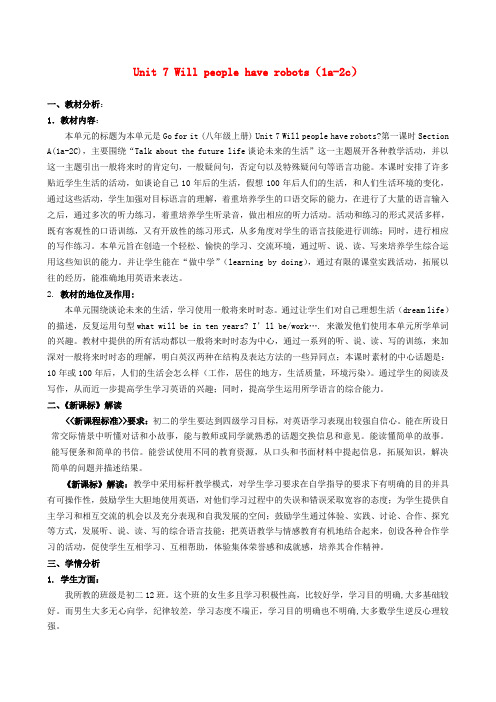
Unit 7 Will people have robots(1a-2c)一、教材分析:1.教材内容:本单元的标题为本单元是Go for it (八年级上册) Unit 7 Will people have robots?第一课时Section A(1a-2C),主要围绕“Talk about the future life谈论未来的生活”这一主题展开各种教学活动,并以这一主题引出一般将来时的肯定句,一般疑问句,否定句以及特殊疑问句等语言功能。
本课时安排了许多贴近学生生活的活动,如谈论自己10年后的生活,假想100年后人们的生活,和人们生活环境的变化,通过这些活动,学生加强对目标语言的理解,着重培养学生的口语交际的能力,在进行了大量的语言输入之后,通过多次的听力练习,着重培养学生听录音,做出相应的听力活动。
活动和练习的形式灵活多样,既有客观性的口语训练,又有开放性的练习形式,从多角度对学生的语言技能进行训练;同时,进行相应的写作练习。
本单元旨在创造一个轻松、愉快的学习、交流环境,通过听、说、读、写来培养学生综合运用这些知识的能力。
并让学生能在“做中学”(learning by doing),通过有限的课堂实践活动,拓展以往的经历,能准确地用英语来表达。
2. 教材的地位及作用:本单元围绕谈论未来的生活,学习使用一般将来时时态。
通过让学生们对自己理想生活(dream life)的描述,反复运用句型what will be in ten years? I’ll be/work…. 来激发他们使用本单元所学单词的兴趣。
教材中提供的所有活动都以一般将来时时态为中心,通过一系列的听、说、读、写的训练,来加深对一般将来时时态的理解,明白英汉两种在结构及表达方法的一些异同点;本课时素材的中心话题是:10年或100年后,人们的生活会怎么样(工作,居住的地方,生活质量,环境污染)。
通过学生的阅读及写作,从而近一步提高学生学习英语的兴趣;同时,提高学生运用所学语言的综合能力。
八年级英语上册《Unit7Willpeoplehaverobots》的知识点归纳
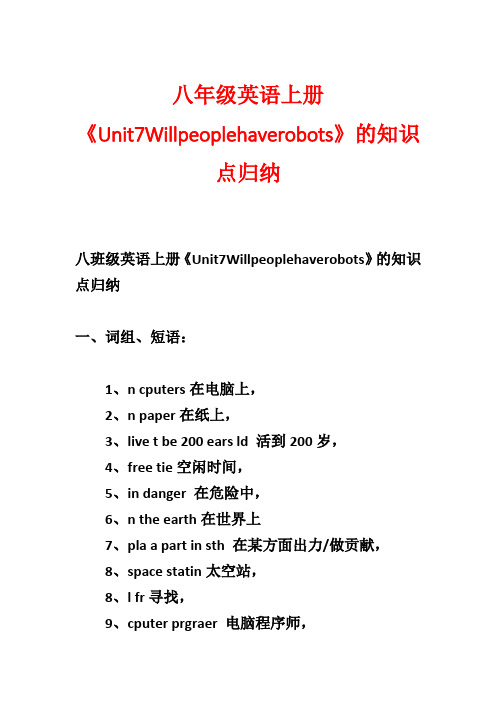
八年级英语上册《Unit7Willpeoplehaverobots》的知识点归纳八班级英语上册《Unit7Willpeoplehaverobots》的知识点归纳一、词组、短语:1、n cputers在电脑上,2、n paper在纸上,3、live t be 200 ears ld 活到200岁,4、free tie空闲时间,5、in danger 在危险中,6、n the earth在世界上7、pla a part in sth 在某方面出力/做贡献,8、space statin太空站,8、l fr寻找,9、cputer prgraer 电脑程序师,10、in the future 在将来,11、hundreds f成百上千的.,12、the sae…as与…一样,13、ver and ver again 反复,14、get bred 无聊,abe/perhaps 用于句首。
Mabe/Perhaps u are right.1. during / fr / in 介词,在……期间。
说到某事是在某一段时间之间发生的用during; 说到某事持续多久则用fr; 说到某事具体发生的时间用in.We visited an places f interest during the suer hlida.I’ve been here fr tw we es.The usuall leave schl in ul.一般将来时结构:肯定式:主语+ will/shall + 动词原形+ 其他will 用于各种人称,shall 用于第一人称。
主语+ be ging t + 动词原形+ 其他be 随人称、数和时间的变化而变换。
否定式:在will/shall/be 后面加nt. will nt = wn’t .一般疑问句:将will/shall/be 提到主语前面。
There be 句型的一般将来时:There will be + 主语+ 其他,意为:将会有。
2020秋八年级英语上册Unit7Willpeoplehaverobots(第4课时)作业课件人教版
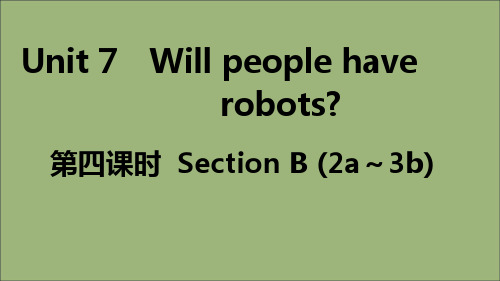
your studies this term.
—Thank you.I hope so.
A.disagree B.decide
C.believe
D.discuss
( C )6.—Can you imagine ______ in the future? —It's really hard to say. A.what did robots look like B.what do robots look like C.what robots might look like D.what might robots look like
Unit 7 Will people have robots?
第四课时 Section B (2a~3b)
快速对答案
Ⅰ
Ⅱ
Ⅲ
1 even
7 Japan 1 humans
1B
2 holiday
2 dangerous 2 B
3 during
3 factories 3 A
4 agree
4 impossible 4 A
A.color
B.shape
C.size
D.look
( B )2.—Does Mike know the news?
—He ______ knows it.But I'm not
very sure.
A.finally
B.probably
C.suddenly D.hopefully
( A )3.—Working on the Internet for so long is bad for our eyes. —I agree ______ you.We should take good care of our eyes. A.with B.to C. for D.at
八年级英语上册Unit7Willpeoplehaverobots基础知识题库(带答案)
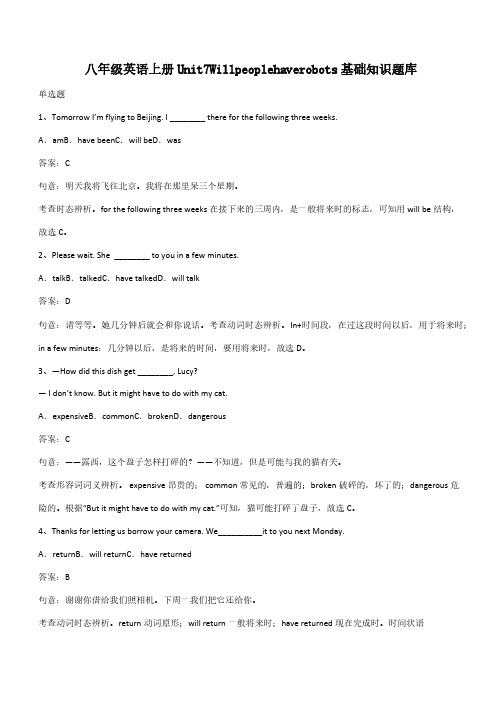
八年级英语上册Unit7Willpeoplehaverobots基础知识题库单选题1、Tomorrow I’m flying to Beijing. I ________ there for the following three weeks.A.amB.have beenC.will beD.was答案:C句意:明天我将飞往北京。
我将在那里呆三个星期。
考查时态辨析。
for the following three weeks在接下来的三周内,是一般将来时的标志,可知用will be结构,故选C。
2、Please wait. She ________ to you in a few minutes.A.talkB.talkedC.have talkedD.will talk答案:D句意:请等等。
她几分钟后就会和你说话。
考查动词时态辨析。
In+时间段,在过这段时间以后,用于将来时;in a few minutes:几分钟以后,是将来的时间,要用将来时,故选D。
3、—How did this dish get ________, Lucy?— I don’t know. But it might have to do with my cat. A.expensiveB.commonC.brokenD.dangerous答案:C句意:——露西,这个盘子怎样打碎的?——不知道,但是可能与我的猫有关。
考查形容词词义辨析。
expensive昂贵的; common常见的,普遍的;broken破碎的,坏了的;dangerous危险的。
根据“But it might have to do with my cat.”可知,猫可能打碎了盘子,故选C。
4、Thanks for letting us borrow your camera. We__________it to you next Monday.A.returnB.will returnC.have returned答案:B句意:谢谢你借给我们照相机。
【2020】八年级英语上册 Unit 7 Will people have robots Section A(1a-2d)习题及参考答案

5. We should care about our ________(环境).
Ⅱ. 根据语境,从方框中选择恰当的短语填空.。
play a part, in great danger, live to be, in 100 years, move to
1. —Is Mr. Green going to ____________ New York?
【2020】八年级英语上册 Unit 7 Will people have robots Section A(1a-2d)习题及参考答案
编 辑:__________________
时 间:__________________
Sectiபைடு நூலகம்n A (1a—2d)
Ⅰ. 根据句意及所给汉语提示,写出句中所缺单词.。
5. Simon and his friends are ____________ and we must do something to help them.
Ⅲ. 根据对话内容,从方框中选择恰当的选项补全对话,其中有两项多余.。
A: Hey, Jeff! (1)________
B: It's hard to say. What's your prediction about that?
A: (2)________
B: Oh, no. Then cities will be more and more crowded.
A: (3)________ In 80 years, some of us will live on another planet.
B: (4)________ Mars (火星) or Venus (金星)?
